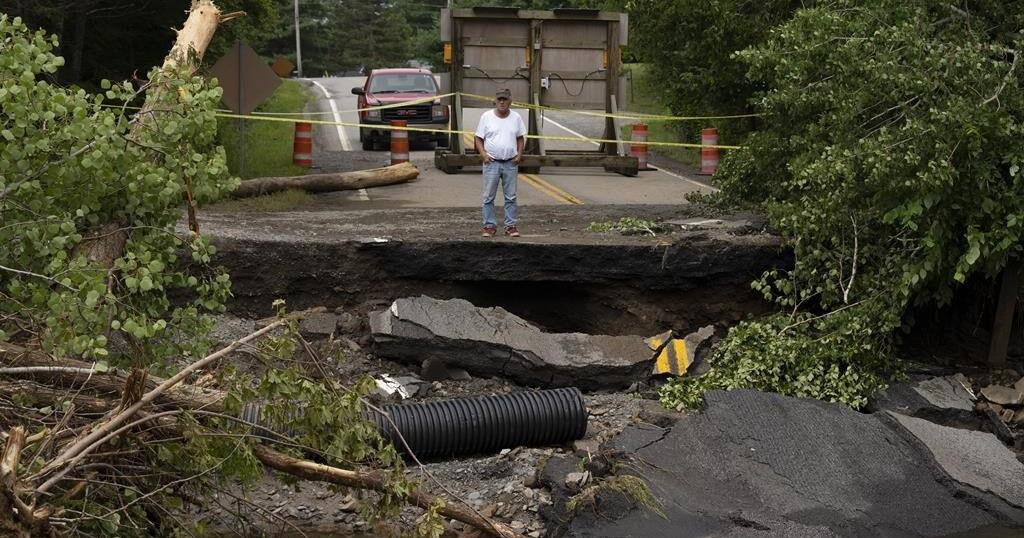HALIFAX – The mother of a boy who died during flash flooding in Nova Scotia is suing the province for negligence, in the latest instance of a citizen trying to hold government accountable for alleged failures during a climate disaster.
Tera Sisco, the mother of six-year-old Colton Sisco — who was swept into floodwaters on July 22, 2023 — is the plaintiff in a notice of action filed against the provincial government and West Hants Regional Municipality on July 17.
The lawsuit, which also names Sisco’s father and grandparents as beneficiaries of the action, doesn’t specify the amount of financial compensation sought.
In a written statement on Tuesday, the mother said she hoped the legal action would allow her to “pursue answers” about what happened. “This next step is hopefully one way to openly learn, educate and better protect those within our province,” she wrote.
Natalie Harnish, 6, was in the same truck as Colton when the vehicle became submerged in floodwaters; both died. Fifty-two-year-old Nick Holland and 14-year-old Terri-Lynn Keddy were swept away from a vehicle on the same road — Route 14 — and also died.
Sisco alleges that the municipality and province failed to send an emergency alert in a “reasonable time frame” after the deputy fire chief in Brooklyn, N.S., requested one at 1:12 a.m. on July 22, 2023, and the RCMP requested soon after, at 1:24 a.m. A review by the municipality completed in May noted that the alert calling for residents to “shelter in place unless unsafe” was sent at 3:06 a.m.
The allegations in the lawsuit are not proven in court, and the municipality and the province have not yet filed statements of defence. Mayor Abraham Zebian said in a text message to The Canadian Press that the municipality can’t comment on legal matters, and John Lohr, minister of municipal affairs, also declined to comment.
According to the notice of action, Chris Sisco, Colton’s father, woke at 2:28 a.m. to find his apartment flooded, and he and four others — including the two children — started to flee in a truck owned by a neighbour. However, as the truck left the driveway it was caught in floodwaters and washed by the current into a water-covered field. The two children were unable to escape the truck; their bodies were found days later after extensive searches of the area, which received about 259 millimetres of rain in a single night.
The family alleges Colton’s death was “preventable,” saying the province and municipality were negligent because they didn’t have adequate policies and procedures to issue alerts properly, and that authorities failed to set up roadblocks to prohibit travel along Route 14 during the flooding.
The lawsuit also alleges the province didn’t have “any or enough flood-risk mapping that could have been used by officials,” and “negligently delegated responsibility for … mapping to local governments.”
The municipality failed to adequately train local officials in preparing alerts, and didn’t have “enough people available” to request and send alerts, the family alleges.
The lawsuit against Nova Scotia is one of several actions being taken in the wake of climate disasters across Canada.
In British Columbia’s Fraser Valley, a class action against the City of Abbotsford was recently certified by the courts for alleged damage resulting from catastrophic flooding on the Sumas Prairie in November 2021, which destroyed livestock, fields and buildings.
The plaintiffs claim flooding happened because the city failed “to close the flood boxes at the Barrowtown Pump Station,” with the city rejecting that as a cause for the damage. None of the claims in the lawsuit have been proven in court.
Law firm Slater Vecchio LLP has also filed a class-action lawsuit against two railways and the attorney general of Canada “for their roles in causing and failing to mitigate” the wildfire that destroyed the interior B.C. town of Lytton on June 30, 2021.
Sam Jaworski, a Vancouver-based lawyer with Slater Vecchio, said legal actions against governments face significant hurdles.
“Suing government can be tricky …. Government is immune (to) civil liability for pure policy decisions,” he explained. “However, government can be liable in civil law for operational failures.”
In the case involving the Sumas Prairie, the plaintiffs are alleging the City of Abbotsford “failed to follow its own protocols” at the pumping station in a way that would keep the floodwaters out of the area, Jaworski said. The plaintiffs have to prove that protocols were breached and that the breach caused the harm, he added.
The lawyer said the likelihood of more cases being brought against governments for negligent climate emergency response may depend on the numbers of people whose lives and properties are damaged, as they can pool their resources for class actions.
However, he added, “when desperate people have their livelihoods destroyed by climate disaster … they’re looking for some actor to hold accountable. You can’t sue God.”
Jocelyn Stacey, a law professor at the University of British Columbia, said in an interview Wednesday that she expects climate-related lawsuits will become more common. “People are experiencing huge losses whenever these floods and wildfires happen,” she said.
Stacey also said “badly outdated” provincial emergency measures laws need to be reformed, building in greater accountability and public reviews after emergencies.
She said this reform, alongside court actions, could give those who suffer losses in climate disasters more information about what went wrong in the planning response, and what is being done to make improvements.
This report by The Canadian Press was first published Aug. 15, 2024.
